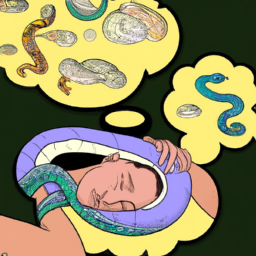Dreams and their interpretations have always fascinated me. With my own experiences of vivid and sometimes intense dreams, I have invested a significant amount of time exploring the science behind dreams and finding ways to better understand their significance.
Violent dreams can be particularly unsettling, leaving us feeling confused and even frightened upon waking. But what do these types of dreams really mean?
In this article, we’ll dive into the world of dreaming and explore the meaning behind violent dreams. We’ll examine the psychological factors that can contribute to these types of dreams, as well as strategies for coping with them.
Whether you’re someone who experiences frequent violent dreams or simply curious about what they signify, this article will provide valuable insights into this mysterious aspect of our subconscious mind.
Key Takeaways
- Violent dreams can be triggered by external factors like violent media and internal factors like stress and anxiety.
- Individuals with higher stress levels tend to have more frequent and vivid nightmares.
- Trauma, PTSD, and depression can significantly impact the subconscious and manifest in violent dreams.
- Coping strategies like dream journaling, mindfulness practices, and seeking therapy can help manage and reduce the frequency of violent dreams.
The Science of Dreaming
Dreaming is a fascinating and mysterious process that scientists still don’t fully understand, but one thing they do know is that everyone dreams every night, whether they remember it or not.
There are many theories about why we dream, but the most widely accepted one is that dreaming helps us process emotions and memories from our waking lives. This is why dream interpretation has become such a popular field of study among psychologists and therapists.
One interesting aspect of dreaming is lucid dreaming, which occurs when you become aware that you are dreaming while still in the dream state. Lucid dreams can be incredibly vivid and realistic, and some people use them as a way to explore their subconscious minds or even control their dreams. However, there is still much to learn about this phenomenon, including how to induce lucid dreams on purpose.
Now let’s turn our attention specifically to violent dreams. While all types of dreams can be unsettling or confusing at times, violent dreams can be particularly disturbing for obvious reasons.
In the next section, we’ll explore what these kinds of dreams can mean and what you can do if you’re experiencing them regularly.
What are Violent Dreams?
You may have experienced those intense, heart-pumping scenarios that seem all too real while you’re fast asleep. Violent dreams can be extremely unsettling and leave us feeling uneasy long after we wake up. But what are they? According to the National Sleep Foundation, violent dreams involve aggressive or hostile themes that can range from being chased by an unknown assailant to engaging in physical altercations with someone we know.
To better understand what causes these dreams, let’s take a look at some of the common triggers. These can include external factors such as watching violent movies or playing violent video games before bed, as well as internal factors like stress and anxiety. In fact, studies have shown that individuals who experience higher levels of stress during waking hours tend to have more frequent and vivid nightmares.
So how can we prevent or treat violent dreams? One way is to try reducing our exposure to stimuli that can trigger them. This could mean avoiding violent media before bed or practicing relaxation techniques like meditation or deep breathing exercises. Additionally, seeking treatment for underlying mental health conditions such as anxiety or PTSD may also be helpful in reducing the frequency of these types of dreams.
As much as we’d like to avoid them altogether, understanding the root causes of our violent dreams can help us feel more in control and empowered when it comes to managing them. In the next section, we’ll explore some psychological factors that may contribute to these types of dream experiences without going into detail about how they affect different people differently.
Psychological Factors
As I delve into the psychological factors that could contribute to violent dreams, three key points come to mind.
Firstly, past trauma and PTSD can have a significant impact on our subconscious and manifest in our dreams.
Secondly, anxiety and stress can create an environment ripe for distressing or violent dreams.
Finally, depression and overall mental health can also play a role in the frequency and intensity of violent dream experiences.
It’s important to recognize these factors as potential triggers for violent dreams and seek professional help if necessary.
Trauma and PTSD
If you’ve experienced trauma or suffer from PTSD, it’s possible for violent dreams to occur. These vivid and terrifying dreams can be a sign of unresolved emotional distress and may indicate a need for further treatment or therapy.
Here are some reasons why trauma and PTSD can lead to violent dreams:
- Flashbacks can haunt us in our sleep as well as waking life. Traumatic events can manifest in dreams as vivid reenactments of the event.
- Avoidance behavior can result in suppressed emotions that then resurface during sleep in the form of violent dreams. Those suffering from PTSD may try to avoid thinking about or discussing the traumatic event they experienced.
- People with PTSD often experience hyperarousal, meaning their nervous system is constantly on high alert. This heightened state of arousal can carry over into their dream life, leading to intense and frightening nightmares.
Managing PTSD through therapy and other treatments can help reduce the frequency and severity of violent dreams. Seeking out trauma therapy specifically designed to address the psychological impact of traumatic events may help alleviate symptoms associated with PTSD.
In the next section, we’ll explore how anxiety and stress also play a role in causing violent dreams.
Anxiety and Stress
Feeling overwhelmed and anxious can cause haunting nightmares that leave you feeling drained and on edge the next day. Anxiety is a common cause of violent dreams, as it leads to increased stress levels that can trigger vivid, disturbing imagery during sleep.
The impact of stress on our mental health cannot be overstated – when we experience stress, our bodies release cortisol, which can lead to disrupted sleep patterns and even nightmares.
There are several causes of anxiety, ranging from environmental factors like work or family life to genetic predispositions towards mental illness. Additionally, chronic stressors can exacerbate feelings of anxiety and increase the likelihood of experiencing violent dreams.
It’s important to address the root causes of anxiety in order to prevent these types of dreams from occurring regularly. With proper treatment and management techniques such as therapy or medication, individuals suffering from anxiety can reduce their symptoms and improve their overall quality of life.
As we move into the subsequent section about depression and mental health, it’s important to recognize that many individuals who suffer from violent dreams may also be struggling with other aspects of their mental health. By addressing all underlying issues contributing to these types of dreams – whether they stem from anxiety or other conditions like depression – individuals can take steps towards improving their overall well-being and reducing the frequency of disturbing dream experiences.
Depression and Mental Health
You may be surprised to learn that depression is one of the leading causes of disability worldwide, affecting over 264 million people globally according to the World Health Organization. Mental health stigma often prevents people from seeking help and getting the treatment they need. It’s important to understand that depression can manifest in different ways, including through violent dreams.
Here are three ways depression and mental health can contribute to violent dreams:
-
Depression affects sleep patterns: People with depression often have trouble sleeping or experience disruptions in their sleep cycle. This can lead to vivid and intense dreams, which may include violence or aggression.
-
Negative thoughts and emotions: Depression can cause individuals to feel hopeless, helpless, or angry. These negative emotions may surface in dreams as well, leading to violent or aggressive dream content.
-
Trauma and past experiences: Individuals who have experienced trauma or difficult life events may also be at a higher risk for experiencing violent dreams due to unresolved emotions and memories.
It’s important for individuals experiencing recurrent violent dreams related to mental health issues like depression to seek help from a mental health professional. In the next section, we’ll discuss how these types of dreams can be interpreted and what steps you can take towards finding relief.
Interpretation of Violent Dreams
When interpreting violent dreams, it’s important to consider the symbols and emotions present in the dream. These dreams can be unsettling, but they are not necessarily indicative of aggressive tendencies or a desire for violence. Rather, they often represent underlying fears or anxieties that need to be addressed.
To better understand these types of dreams, it can be helpful to keep a dream journal and make note of any recurring themes or symbols. It’s also important to pay attention to how you feel during and after the dream – do you wake up feeling anxious or relieved? By analyzing these elements, we can gain insight into our subconscious mind and identify potential sources of stress in our waking lives.
While there is no surefire way to prevent violent dreams from occurring altogether, managing stress levels through relaxation techniques such as meditation or yoga can help reduce their frequency. Additionally, seeking therapy or counseling may be beneficial for those who experience frequent nightmares as they may be related to underlying mental health issues such as anxiety or PTSD. By addressing these root causes, we can work towards achieving more peaceful and restful sleep patterns.
Moving onto the next section about ‘the symbolism of violence’, it’s important to note that understanding the interpretation of violent dreams is just one aspect of understanding their meaning.
The Symbolism of Violence
Understanding the symbolism of violence in dreams can help us gain insight into our deepest fears and anxieties. Violence is often a manifestation of our internal conflicts, and these conflicts are reflected in our dreams through recurring patterns. These patterns may hold clues about unresolved issues or traumas that we need to address.
Interpretation of violent dreams requires an understanding of the personal meanings attached to symbols. For example, a dream about being chased by a monster may represent feeling hunted by a particular person or situation in waking life. Alternatively, it could symbolize the fear of losing control over one’s own life. It’s important to approach interpretation with an open mind and consider how each symbol might relate to your unique experiences.
Recurring patterns of violence in dreams can be particularly concerning, as they indicate persistent issues that require attention. Consider keeping a dream journal to track these patterns and identify any common themes or triggers. This information can be useful when seeking professional help or developing coping strategies for managing anxiety related to violent dreams.
Recognizing the symbolism behind violent dreams is just one step towards better understanding ourselves and addressing underlying issues that may be affecting our mental health. Coping strategies can also play an important role in managing anxiety related to disturbing dream content – but more on that later!
Coping Strategies
When it comes to coping with violent dreams, there are several strategies that I find helpful.
First and foremost, journaling and self-reflection have been incredibly useful in gaining a deeper understanding of my emotions and subconscious thoughts.
Additionally, talking to a therapist has allowed me to work through any underlying issues or trauma that may be contributing to these dreams.
Finally, incorporating mindfulness and meditation practices into my daily routine has helped me manage stress and anxiety, leading to more peaceful sleep.
Journaling and Self-Reflection
By journaling and reflecting on our dreams, we can gain insight into the underlying emotions and experiences that may be contributing to violent dream content. Daily practice of dream analysis through journaling can help us identify patterns, symbols, and themes in our dreams. This process allows us to become more aware of our subconscious thoughts and feelings that may be influencing our dream content.
In fact, a study found that individuals who journaled their dreams had a significant decrease in the frequency of violent dreams. This suggests that by taking time to reflect on our dreams and their meaning, we can work through any unresolved emotions or traumas that may be causing disturbing dream content. By utilizing journaling as a tool for self-reflection, we become active participants in understanding and healing ourselves. Speaking with a therapist is another important step towards addressing violent dreams caused by unresolved issues.
Talking to a Therapist
If you’re struggling with persistent and unsettling dream content, exploring options and finding support from a therapist can be an important step in finding clarity and resolving any underlying emotional or psychological issues.
Violent dreams may be a sign of unresolved trauma, anxiety, or stress that requires attention and care. A therapist can provide a safe space to process these feelings and help you understand the meaning behind your dreams.
Talking to a therapist about your violent dreams can also offer insight into patterns or behaviors that may be contributing to their frequency. They may suggest techniques such as Cognitive Behavioral Therapy (CBT) or Eye Movement Desensitization and Reprocessing (EMDR) to help alleviate symptoms related to traumatic experiences.
Additionally, therapy can provide tools for coping with stressors that may trigger these types of dreams in the future. Finding support through therapy is not only beneficial for managing current symptoms but also for long-term emotional well-being.
Transitioning into the subsequent section about ‘mindfulness and meditation’, it’s important to note that therapy doesn’t have to be the only solution for dealing with violent dreams. Incorporating mindfulness practices such as meditation, yoga, or deep breathing exercises can also assist in reducing anxiety levels before bed. These techniques promote relaxation of the mind and body, ultimately leading to more restful sleep.
Mindfulness and Meditation
During my sessions with a therapist, I learned that talking about my violent dreams was only the first step in addressing them. My therapist introduced me to mindfulness and meditation techniques as tools to help me manage my emotions and reduce stress.
One technique she taught me was mindful breathing. By focusing on my breath, I could bring myself back to the present moment and calm my racing thoughts. Visualization techniques were also helpful, allowing me to imagine a safe space where I could retreat when feeling overwhelmed by my dreams or other stressors.
With practice, these techniques became second nature, helping me find relief from the anxiety caused by my violent dreams. Now that I’ve incorporated these mindfulness and meditation practices into my daily routine, I’ve noticed a significant improvement in both the frequency and intensity of my violent dreams.
However, there is still work to be done in addressing underlying trauma or issues that may be contributing to them.
Addressing Underlying Trauma or Issues
You need to confront the underlying trauma or issues causing these violent dreams before they continue to haunt you. It’s important to acknowledge that these dreams are a manifestation of something deeper going on in your psyche.
If you’ve experienced trauma or have unresolved emotional issues, it’s possible that they’re resurfacing through your subconscious mind in the form of these violent dreams. To begin the healing process, try implementing self-care techniques such as journaling, exercise, and therapy.
Journaling can help you identify any patterns or triggers associated with your violent dreams. Exercise not only helps reduce stress and anxiety but also releases endorphins, which can improve your mood overall. Therapy is another valuable tool for addressing underlying trauma or emotional issues. A therapist can provide a safe space for you to explore and process difficult emotions.
It’s important to remember that healing from trauma and emotional wounds takes time and effort. However, by confronting these issues head-on through self-care and therapy, you’ll be taking an important step towards reducing the frequency and intensity of your violent dreams.
In the next section about reducing stress and anxiety, we’ll explore additional strategies for managing your mental health on a daily basis.
Reducing Stress and Anxiety
By implementing relaxation techniques like mindful breathing and exercise, we can alleviate stress and anxiety that may be contributing to our unsettling dreams.
Stressful situations during the day can lead to restless nights filled with violent dreams. By reducing overall stress levels, we can reduce the frequency of these dreams.
Mindful breathing is a simple yet powerful technique that involves focusing on your breath and clearing your mind of any distractions. This practice has been shown to lower cortisol levels, decrease anxiety, and improve overall mental health.
Incorporating exercise into our daily routine is another effective way to manage stress levels and promote healthy sleep patterns.
Incorporating mindfulness practices like deep breathing or yoga into our daily routine can have a profound impact on not only our quality of sleep but also our overall well-being. By taking proactive measures to reduce stress and anxiety in our lives, we can create a more peaceful environment for ourselves both mentally and physically, leading to a better night’s rest.
Promoting healthy sleep habits is essential for both physical and mental health as it allows us to recharge and prepare for the challenges ahead without being weighed down by the effects of poor sleep quality.
Promoting Healthy Sleep
When it comes to promoting healthy sleep, there are a few key points that I find to be particularly important.
First and foremost, establishing good sleep hygiene practices is crucial. This includes limiting caffeine intake and avoiding technology use before bedtime.
Additionally, creating a relaxing sleep environment can greatly improve the quality of your rest.
Finally, sticking to a regular sleep schedule can help regulate your body’s internal clock and promote more consistent restful nights.
By focusing on these aspects of healthy sleep habits, you can work towards achieving better overall wellness and reducing stress levels in your daily life.
Sleep Hygiene
To improve your sleep hygiene, it’s important to establish a consistent bedtime routine and avoid screens before bed. This means going to sleep and waking up at the same time every day, even on weekends. It also means creating a relaxing bedtime routine that helps you wind down and prepare for sleep.
Here are three tips that can help you create a better bedtime routine:
- Keep a sleep diary or use a sleep tracker to monitor your progress.
- Take a warm bath or shower before bed to relax your muscles.
- Read a book instead of watching TV or scrolling through social media.
By implementing these simple changes, you can help improve your chances of getting a good night’s rest. Once you’ve established a consistent bedtime routine, it’s important to focus on creating a relaxing environment in your bedroom.
Creating an environment that is conducive to relaxation can help reduce stress levels and promote healthy sleep habits. In the next section, we’ll explore some tips for creating the perfect sleeping space.
Creating a Relaxing Environment
Creating a relaxing environment in your bedroom is like creating a cozy cocoon where you can rest and recharge. The space you sleep in should be conducive to deep relaxation and calmness. Setting intentions for your sleep environment is important, as it has a direct impact on the quality of your sleep. One way to create a soothing atmosphere is through aromatherapy. Using essential oils such as lavender, chamomile or ylang-ylang can help promote relaxation, reduce stress levels and improve overall sleep quality.
To further enhance the ambiance of your bedroom, consider making small changes such as investing in comfortable bedding or adding soft lighting. Additionally, decluttering your space may help create a sense of calmness and orderliness, which can positively affect your mood before going to bed. Below is a table that outlines some ways you can create a relaxing environment in your bedroom:
| Creating A Relaxing Environment | ||||
|---|---|---|---|---|
| Set intentions for the space | Use aromatherapy with essential oils such as lavender or chamomile | Invest in comfortable bedding | Add soft lighting to promote relaxation | Declutter the space |
Establishing a regular sleep schedule is an important step towards achieving better sleep quality. By sticking to consistent sleeping habits, our bodies are able to regulate their natural circadian rhythms more efficiently than if we were constantly changing our bedtime routines.
Establishing a Regular Sleep Schedule
As we discussed earlier, creating a relaxing environment is essential in promoting good sleep. However, it’s not the only factor that contributes to having restful nights.
To further enhance our sleep quality, establishing a regular sleep schedule is equally important. Establishing routine may sound boring for some of us who love spontaneity and flexibility in our daily lives. But when it comes to our sleep patterns, consistency is key to have optimal rest.
Having a regular bedtime and wake-up time helps regulate our body clock, making it easier for us to fall asleep at night and wake up feeling refreshed in the morning.
Here are some benefits of establishing a regular sleep schedule:
- Improved mood and energy levels
- Increased productivity and focus
- Better overall health (lower risk of obesity, heart disease, etc.)
- Reduced stress and anxiety levels
Investing in our sleep quality by establishing routine may require some discipline and adjustment at first but eventually leads to better physical and mental well-being. So let’s give ourselves the gift of consistent good night sleeps!
Frequently Asked Questions
Can violent dreams be a sign of a serious mental illness?
As someone who has experienced violent dreams, I understand the concern about potential mental illness. Exploring treatment and understanding triggers can help manage these dreams, but they do not necessarily indicate a serious mental illness.
Are violent dreams more common in certain age groups or demographics?
Gender differences and psychological factors can play a role in the prevalence of violent dreams. Research suggests that men may experience more violent dreams than women, and those with certain mental health disorders may also be at higher risk.
Can medication or substance use affect the frequency or intensity of violent dreams?
As someone who wants to serve others, it’s important to know that medication and substance use can have psychological implications and neurological effects on the frequency and intensity of violent dreams. It’s crucial to talk with a healthcare professional for guidance.
How do cultural or societal influences impact the interpretation of violent dreams?
Ah, the ever-present influence of culture and societal norms. These factors play a significant role in how we interpret everything from fashion to food choices. The same is true for our dreams, including those of a violent nature. How we process these experiences can vary greatly based on our upbringing and surroundings.
Is there a way to stop having violent dreams altogether?
I’ve found that practicing relaxation techniques, avoiding violent media before bed, and talking to a therapist can help reduce the frequency of violent dreams. Coping methods like these can have a positive impact on mental health.
Conclusion
In conclusion, violent dreams can be a jarring and unnerving experience for anyone. However, understanding the science behind dreaming and the various psychological factors at play can provide some insight into why these types of dreams occur.
It’s important to note that while violent dreams don’t necessarily mean someone is violent in real life, they may be indicative of underlying trauma or stress.
It’s essential to address any potential issues causing violent dreams to promote healthy sleep patterns. Coping strategies such as relaxation techniques and addressing underlying trauma or issues can help reduce stress and anxiety levels.
Ultimately, if you’re experiencing violent dreams regularly, seeking professional help from a therapist or healthcare provider may be beneficial in managing this aspect of your mental health. After all, ensuring a peaceful night’s rest is paramount to living our best lives – let’s prioritize it!









